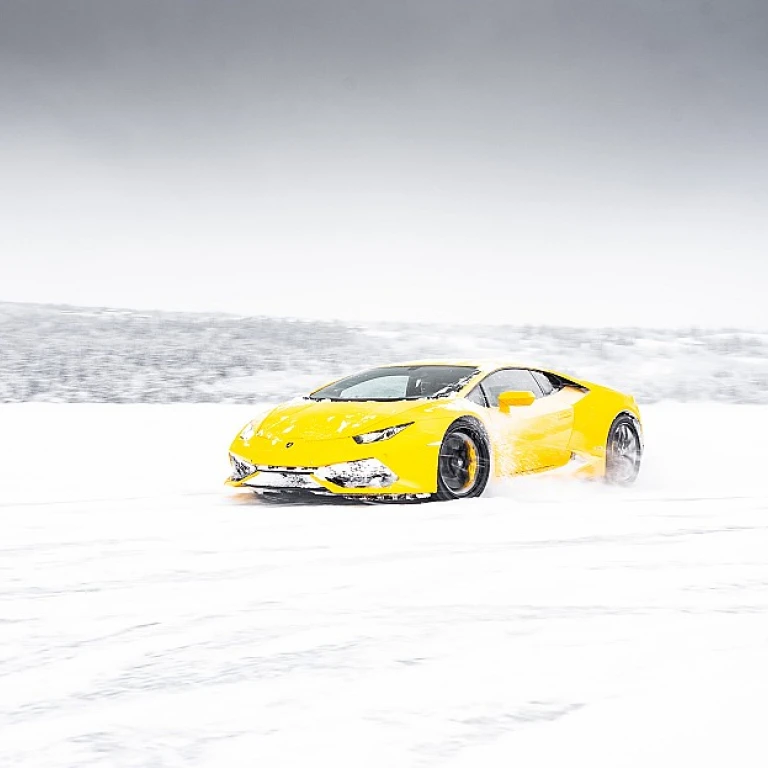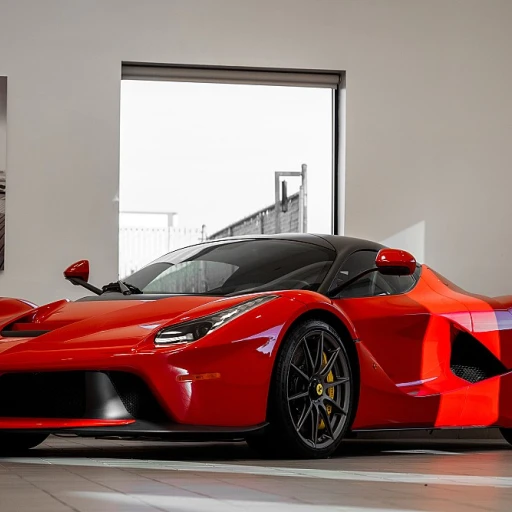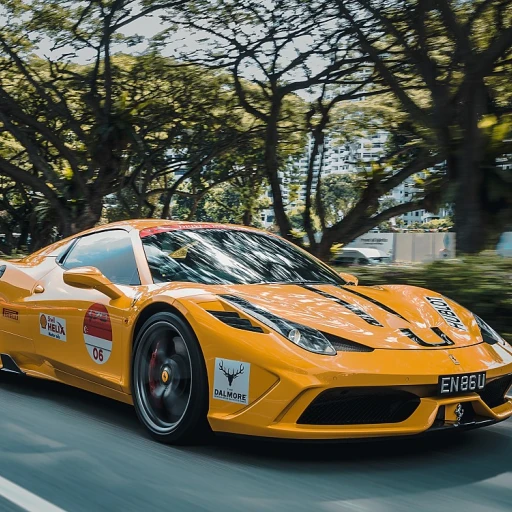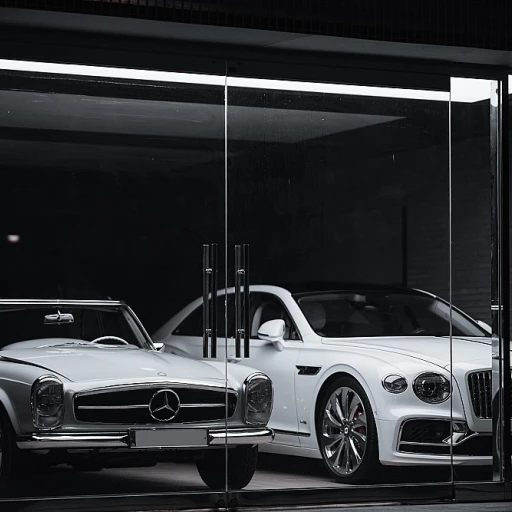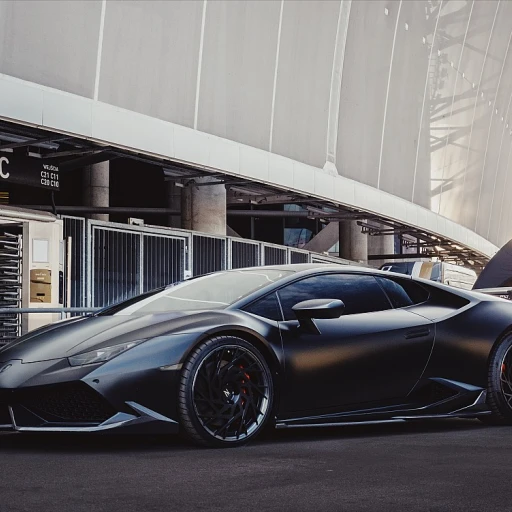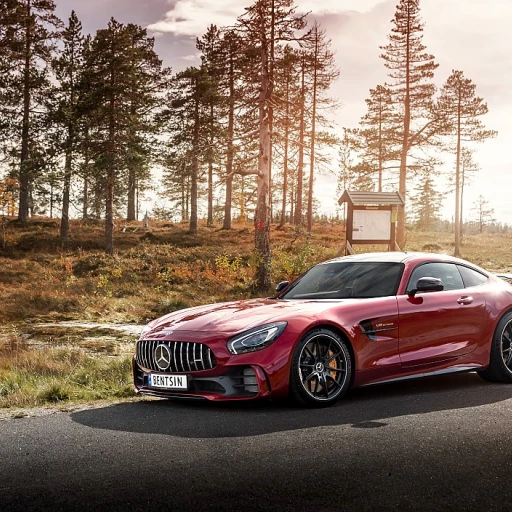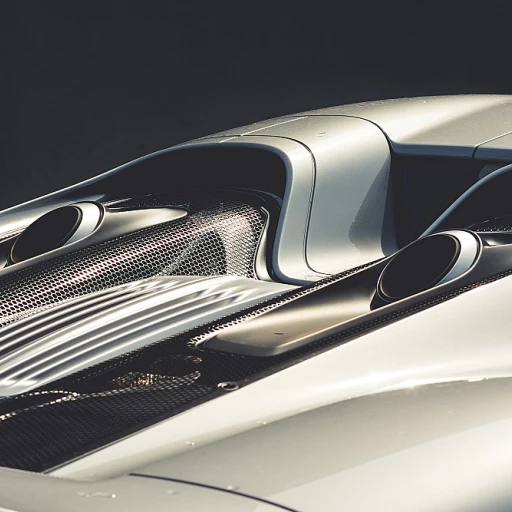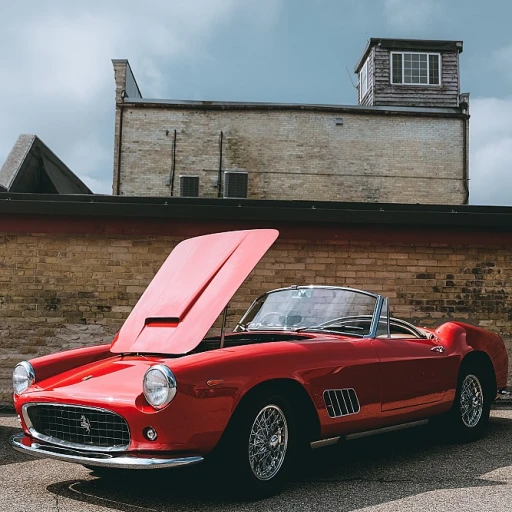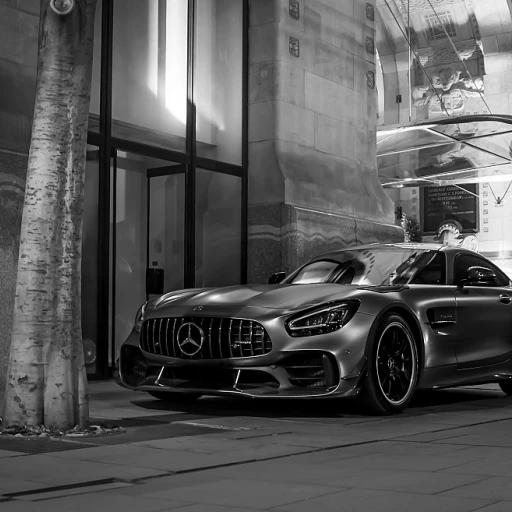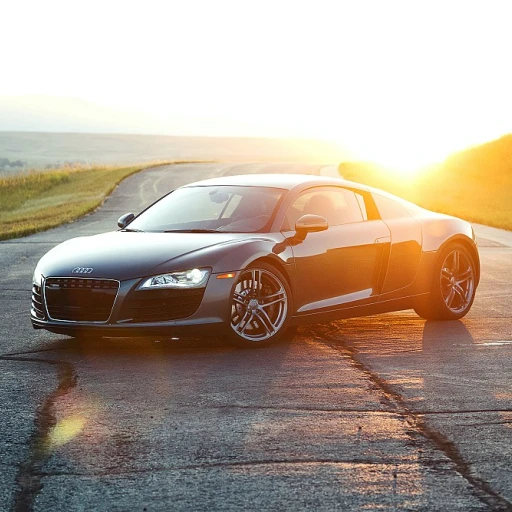The allure of less-known luxury car brands
Exploring the lesser-known luxury car brands
When you think luxury cars, names like BMW, Mercedes-Benz, and Audi might instantly come to mind. However, the universe of luxury car brands is much broader, featuring some hidden gems that deliver a unique blend of performance, craftsmanship, and exclusivity.
Alfa Romeo's hidden legacy
One such brand is Alfa Romeo, hailing from Italy. Known for its sporty pedigree and aesthetic appeal, Alfa Romeo has garnered quiet yet devoted admiration. The brand has a legacy that dates back to 1910, offering models that blend racing heritage with everyday luxury. According to J.D. Power, Alfa Romeo's customer satisfaction rate is impressively high at 83%.
Aston Martin's bespoke allure
Another name worth mentioning is Aston Martin, originating from the United Kingdom. Best known for its association with James Bond, this brand specializes in bespoke design, delivering tailor-made experiences with each unit. It continues to maintain its top-tier status, thanks to models like the DB11 and the new Vantage, both visual and engineering masterpieces.
Bentley's quiet excellence
Bentley, also from the UK, is often overshadowed by its more flamboyant competitors. Yet, it remains a paragon of quiet excellence, focusing on impeccable craftsmanship and superior performance. The Mulliner division allows customers to customize their cars down to the very stitching, making each Bentley truly unique. A survey by Market Watch identified Bentley's craftsmanship as one of the main reasons why 95% of owners remain loyal to the brand.
The unsung marvel of Genesis
Originating from South Korea, Genesis has emerged as a strong contender in the luxury car market. Launched by Hyundai, Genesis offers a fresh take on luxury, combining cutting-edge technology with sleek designs. Models like the Genesis G70 and G80 are gaining traction, making a significant impact on overall sales numbers. According to Car and Driver, the G80 sales numbers increased by 21% in 2021, a testament to its growing popularity.
Delving into the minute details
Luxury car brands often center around core elements such as performance, design, and heritage. However, less-known brands frequently push the envelope in terms of bespoke personalization and innovation, offering something genuinely unique in an already exclusive market. Expect to delve further into the rise of boutique luxury car brands, performance and innovation, and the customer experience these brands deliver in upcoming sections.
The rise of boutique luxury car brands
The emergence of bespoke car brands
While mainstream brands like BMW, Mercedes-Benz, and Audi dominate the luxury car market, there's a growing interest in boutique luxury car brands that offer something uniquely tailored and exclusive. These brands cater to affluent customers seeking individuality and exclusiveness in their vehicles.
Highly specialized market
These bespoke brands operate in a highly specialized market, often limiting production to maintain exclusivity. For example, brands like Pagani and Koenigsegg produce fewer than 50 cars annually. This limited production not only ensures rarity but also emphasizes top-tier craftsmanship and innovation.
Ferrari is another example, where special projects allow clients to work closely with the engineers to produce one-of-a-kind models, a trend that's seeing immense popularity among ultra-high-net-worth individuals.
Performance meets luxury
When it comes to performance, these boutique brands often surpass mainstream luxury car manufacturers. Cars such as the Pagani Huayra and Koenigsegg Jesko offer unprecedented speed and performance thanks to cutting-edge technology and meticulous engineering.
These vehicles usually come with eye-watering price tags, with the Pagani Huayra Roadster BC, for instance, starting at around $3.5 million. However, the blend of performance and luxury justifies the cost for passionate car collectors.
Design: from concept to masterpiece
The design philosophy of boutique brands is another reason customers are drawn to them. Often, each vehicle is a masterpiece, reflecting the brand's commitment to aesthetics and innovation. For example, the intricate details in Bugatti’s Chiron are a testament to the brand’s longstanding tradition of mixing art with automotive excellence.
Additionally, brands like Aston Martin and Rolls-Royce offer extensive customization options, from exotic materials to customizable paintwork, allowing clients to create a car that aligns perfectly with their tastes and personalities.
For more extensive details on specific luxury cars for sale and best high-end vehicles, you might want to check this comprehensive guide.
Performance and innovation: hidden treasures
Small brands making a big difference
When we think of luxury cars, brands like BMW, Mercedes-Benz, and Audi often come to mind. However, many lesser-known brands are pushing the boundaries of performance and innovation. Unlike mainstream manufacturers, these boutique brands can focus more on unique, cutting-edge technologies.
Performance: the unsung heroes
Some lesser-known luxury car brands excel in specific performance aspects. For instance, Pagani, an Italian manufacturer, is renowned for its hypercars that blend art and science seamlessly. Their Zonda and Huayra models feature advanced aerodynamics and use materials like carbon-titanium, unheard of in mainstream vehicles. According to a 2020 report by Autoblog, Pagani's unique materials reportedly offer a 28% increase in strength compared to conventional carbon fiber.
Innovation: where game changers thrive
Koenigsegg, a Swedish manufacturer, has made a name for itself by producing hypercars with innovative engine technology. Their Regera model features a hybrid driveline with a revolutionary direct drive system, eliminating the traditional gearbox. This innovation offers a more efficient power delivery, reducing weight and complexity. Hybrid tech is crucial in achieving both performance and efficiency, a fact underscored by Koenigsegg's groundbreaking achievements.
The role of electric and hybrid technology
Tesla has been a game-changer in the electric vehicle market, but there are also other players. Lucid Motors, founded by a former Tesla engineer, is making waves with its first luxury electric sedan, the Lucid Air, combining long-range capability with cutting-edge autonomous driving features. According to MotorTrend, the Lucid Air offers an astonishing range of over 500 miles on a single charge, setting a new industry benchmark.
Emerging trends in fuel efficiency
Another brand making headway is Polestar, a venture by Volvo and Geely, pushing the envelope in electric performance vehicles. Their Polestar 2 model is an electric fastback with minimalist Scandinavian design and competitive range. A Car and Driver review highlighted its dual-motor setup, providing an impressive 408 horsepower while maintaining a range of about 270 miles.
While mainstream brands offer a plethora of choices, these hidden gems in the luxury car market often deliver unmatched innovation and performance. They embody the spirit of pushing boundaries and setting new standards, making them crucial players in the evolving automotive landscape.
Design and craftsmanship: art on wheels
Uniqueness in every curve and stitch
The charm of luxury car brands doesn't just lie in their name or performance; it is in the artistry of their design and craftsmanship. When we speak about the allure of brands like Aston Martin, Ferrari, or Rolls-Royce, it is often their incessant attention to detail that comes to mind.
Taking Aston Martin as an example, each panel is hand-finished, ensuring that no two vehicles are identical. According to a report by Autocar, these iconic vehicles undergo meticulous inspection processes that make each car a masterpiece. Similarly, Rolls-Royce incorporates a staggering number of 44,000 paint colors and will meticulously match any shade requested by customers. This dedication to precision is undoubtedly a key attractor for car aficionados.
Material magic: when quality speaks
It's not just about how the interiors and exteriors look, but also the materials used. Brands like Porsche and Bentley push the envelope with top-grade leather, exotic woods, and rare metals. In fact, Bentley's Bentayga SUV offers a Breitling dash clock option that is adorned with eight diamonds. Talk about sheer opulence!
Alastair Campbell, a renowned expert in automotive design, once said, "It's not just a car, but a piece of art on wheels." This rings true as luxury brands like Maserati use silk interiors crafted by Ermenegildo Zegna, enhancing the tactile experience of their well-heeled customers.
Cutting-edge elegance and technology
BMW and Mercedes-Benz are known for blending luxury with cutting-edge technology seamlessly. The BMW 7-series and Mercedes-Benz S-Class come equipped with innovative features such as gesture controls, advanced AI-powered infotainment systems, and dynamic climate controls that set them apart in the cluttered luxury car market.
According to a 2022 report by BusinessWire, the integration of technology in these cars doesn't just aim for comfort but also ensures the highest levels of safety and convenience. The top luxury car brands continuously introduce features that redefine driving experiences, making them a favorite among high-end consumers.
Bespoke craftsmanship tailored to you
Land Rover and Jaguar offer exceptional bespoke customization options through their Special Vehicle Operations (SVO) and Special Vehicle Operations (SVO) departments. A bespoke finish can significantly elevate the market value of a luxury car, reflecting personal tastes and ensuring that your vehicle stands out from the crowd. [source]
The role of heritage and tradition
Preserving the legacy
Luxury car brands often have a rich heritage and tradition that play a crucial role in their appeal. Take Rolls-Royce, for instance, a brand synonymous with unparalleled craftsmanship and an illustrious history dating back to 1904. Despite advancements in technology, Rolls-Royce maintains its commitment to handcrafting each vehicle, ensuring that traditional craftsmanship remains at the forefront.
Similarly, Mercedes-Benz, which originated in Germany, is celebrated for merging its storied past with cutting-edge innovation. Established in 1926, Mercedes-Benz has consistently pushed the boundaries of what luxury and performance mean, all while honoring its deep-rooted traditions.
Heritage influences design and craftsmanship
Beyond the brand name, heritage significantly impacts design and craftsmanship. Porsche, another German marvel, is a prime example. Known for their iconic 911 model, Porsche stays true to its original design philosophy while integrating modern technology. This delicate balance is what keeps enthusiasts loyal to the brand.
Land Rover, with its roots in the United Kingdom, embodies the blend of heritage and rugged reliability. The Range Rover models have evolved over the years but still retain their quintessential British charm and off-road prowess. This blend of tradition and modernity resonates with a clientele that values both legacy and innovation.
Customer loyalty and brand identity
Heritage isn't just about the past; it's a vital component of a brand's identity and customer loyalty. BMW's M series shows how commitment to a performance lineage can build a dedicated following. Enthusiasts appreciate the brand's consistent dedication to delivering sports car performance within a luxury framework.
Lexus, a brand established by Toyota, mixes luxury with Japanese precision. Since its debut in 1989, Lexus has rapidly gained a reputation for reliability and customer satisfaction, a testament to how young luxury brands can carve out a space by adhering to quality and tradition.
Brand consistency and market positioning
A consistent focus on heritage helps luxury car brands maintain a unique position in an increasingly competitive market. Bentley, with its origins in the early 20th century, has made a name for itself with grand tourers and a commitment to luxurious detailing. This consistency reinforces its market positioning as an ultra-luxury car brand.
It's the amalgamation of legacy, craftsmanship, and innovation that keeps these brands at the top. Whether it's a Mercedes-Benz's blend of tradition and technology, or a Range Rover's British roots, heritage plays an indispensable role in shaping luxury car brands' identities and ensuring their lasting appeal.
For more insights on how bespoke personalization impacts luxury cars, check out our detailed analysis here.
Customer experience and personalization
Immersive customer experiences
Luxury car brands today are not just about the vehicles themselves; they are about the entire ownership experience, from the moment you walk into the showroom to the personalized services you receive long after the purchase.
Personalized services: Brands like Rolls-Royce and Bentley have taken personalization to the next level by offering tailor-made experiences. This might include exclusive driving experiences, invitation-only events, and bespoke customization options that cater to the individual tastes and preferences of their customers (bespoke personalization in luxury cars).
The showroom experience
Walking into a luxury car showroom is an experience in itself. These showrooms are designed to be luxurious and welcoming, offering potential buyers a taste of the brand’s lavish lifestyle. For example, BMW and Mercedes-Benz have transformed their showrooms into interactive environments where customers can experience the latest models through virtual reality and touch screen simulators.
Virtual reality: According to Statista, about 43% of luxury car brand showrooms now incorporate some form of virtual reality to enhance the customer experience (Statista, usage in luxury car dealerships).
After-sales service
The relationship between a luxury car brand and its customer doesn't end with the sale. Offering high-quality, personalized after-sales service is crucial for maintaining customer loyalty. Brands like Porsche and Land Rover offer extensive after-sales services that include on-site maintenance, 24/7 customer support, and even pick-up and drop-off services.
Customer support:Mercedes-Benz and BMW are known for their exceptional customer support services, which are available globally, ensuring that luxury car owners get the care they need, no matter their location.
Customer loyalty programs
Loyalty programs for luxury car owners are becoming more sophisticated, often offering exclusive benefits and experiences. For instance, Mercedes-Benz has the "Mercedes me" program, which includes features like maintenance tracking, personalized news, and exclusive event invitations.
Exclusive events: Studies show that customer loyalty programs that offer unique experiences have higher success rates. A 2019 report by Bain & Company revealed that luxury brands with strong loyalty programs saw a 5-10% increase in customer retention rates.
Market trends and future outlook
Analysis of market trends and predictions for the future
Observing the luxury car market reveals that the industry continuously evolves, driven by advancing technology and changing consumer preferences. According to a report from Statista, the global luxury car market size was valued at around $410 billion in 2020 and is expected to grow with a CAGR of 5.3% from 2021 to 2027.
Luxury brands like BMW, Mercedes-Benz, and Audi have consistently maintained their dominance. For example, Mercedes-Benz sold around 2.05 million luxury vehicles worldwide in 2020, despite market fluctuations. The company remains steadfast due to its diverse range of models, from the luxurious S-class to the cutting-edge electric EQ series.
Shifts in consumer preferences toward electric and hybrid vehicles
A significant trend in the luxury car market is the shift toward electric and hybrid vehicles. BMW and Audi have pioneered this movement with models like the BMW i8 and Audi e-tron. As per a report by MarketWatch, the electric vehicle market is projected to increase from USD 162 billion in 2019 to USD 802 billion by 2027, emphasizing eco-friendly innovations.
Rolls-Royce and Bentley, traditionally known for their gas-guzzling engines, are also entering this electrified race. Rolls-Royce's announcement of their electric Spectre model sets a new luxury standard, aligning with their goal to have an all-electric lineup by 2030.
Personalization and bespoke experiences
Another noteworthy trend is the emphasis on personalization. Luxury brands increasingly offer bespoke services to cater to individual preferences. Porsche, for example, offers extensive customization options, allowing clients to tailor their 911 or Cayenne to personal tastes. This focus on uniqueness helps differentiate high-end brands from mainstream counterparts.
Land Rover is known for their Range Rover series—iconic for blending luxury with rugged performance. The new Range Rover Velar offers various customization options, including exclusive leather trims and unique color palettes. Land Rover ensures that every vehicle rolling off the assembly line reflects the owner's personal touch.
The influence of digital transformation
Digital transformation significantly influences the luxury car market. Brands harness augmented reality and virtual showrooms to enhance customer experiences. For example, BMW's iX3 launch involved a virtual event enabling potential buyers to explore the vehicle in 3D. Similarly, Mercedes-Benz invested in AI and connectivity with their MBUX system, offering an advanced digital user interface.
With in-car technology becoming more sophisticated, luxury brands adapt to provide the most cutting-edge digital experiences. Audi's virtual cockpit for their latest models exemplifies how integrating advanced tech can heighten the driving experience.
Case studies: standout models and their impact
Aston martin dbs superleggera: a modern marvel
The Aston Martin DBS Superleggera is a prime example of how established brands continue to innovate. With its twin-turbo V12 engine, the DBS can sprint from 0 to 60 mph in just 3.4 seconds. It blends performance with luxury, making it a darling for enthusiasts who crave both speed and sophistication. According to Top Gear, the DBS Superleggera is “a stunning Gran Turismo” that offers “immense power and relentless acceleration.”
Alfa romeo giulia quadrifoglio: italian passion meets performance
Alfa Romeo's Giulia Quadrifoglio is a standout model that encapsulates the brand's heritage and Italian flair. With a bi-turbo V6 engine and a top speed of 191 mph, it's not just about looks; it's a beast on the tarmac. In Car and Driver's review, they noted the Giulia Quadrifoglio's “exhilarating performance” and acclaimed it as one of the best-driving sports sedans available.
Rolls-royce cullinan: redefining luxury suvs
The Rolls-Royce Cullinan has set new standards in the ultra-luxury SUV market. Named after the largest diamond ever discovered, the Cullinan blends Rolls-Royce’s signature opulence with the ruggedness expected from an SUV. According to Forbes, it’s not just a car but “a gated community on wheels.” It’s perfect for those who demand uncompromised luxury in every journey.
Bmw i8: futuristic and sustainable
BMW stepped into the future with the i8, combining hybrid technology with a stunning design. This car is an eco-friendly option that doesn’t compromise on performance or style. Motor Trend describes the i8 as “an eye-catching sports car that’s also kind to the environment.” It's a proof that sustainability and luxury can go hand in hand.
Mercedes-benz s-class: the epitome of opulence
The Mercedes-Benz S-Class has long been a benchmark in the luxury sedan segment. Its latest iteration features advanced autonomous driving capabilities and a plush interior that redefines comfort. According to Consumer Reports, the S-Class offers “an unparalleled blend of comfort, technology, and performance,” making it a top choice for those who seek the best of everything.
Porsche taycan: electrifying performance
Porsche’s entrance into the electric vehicle market with the Taycan has been nothing short of spectacular. With its Porsche DNA intact, the Taycan offers electrifying performance and a luxurious interior. The Verge claims that the Taycan “sets a new standard for electric vehicles,” proving that electric cars can be just as thrilling as their gasoline counterparts.

